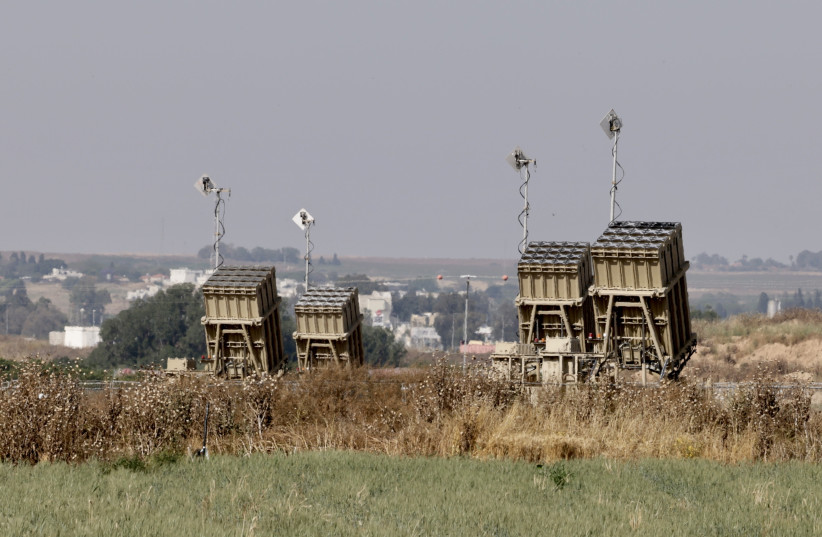Rocking out under the Iron Dome – reporter’s notebook
It was the most surreal moment I’ve ever witnessed at a concert – and I reviewed Lady Gaga for The Jerusalem Post. There we were, tens of thousands of Aviv Geffen fans in Park Hayarkon, Israel’s biggest concert venue, singing and dancing like it was any other night.
But, of course, it wasn’t any other night; there’s a war on.
As the 90s rock icon reached the dramatic ending of his song “Hamichtav” (The Letter), two yellow dots appeared in the sky. They moved in a diagonal, upwards motion and disappeared behind some clouds before reappearing and exploding.
It was the Iron Dome, protecting Tel Aviv from missiles launched by Palestinian Islamic Jihad.
 The Iron Dome anti-missile system stands ready on the border with Gaza amid Operation Shield and Arrow, May 11, 2023. (credit: MARC ISRAEL SELLEM/THE JERUSALEM POST)
The Iron Dome anti-missile system stands ready on the border with Gaza amid Operation Shield and Arrow, May 11, 2023. (credit: MARC ISRAEL SELLEM/THE JERUSALEM POST)The audience applauded, and no offense to Geffen, who puts on a great show, it wasn’t for him.
Geffen finished the song – the show must go on, after all – before addressing the even more impressive show in the sky.
“I think it’s going to take me months to digest what happened,” Geffen said.
The rock star thanked the Home Front Command for allowing him to perform as planned.
“I told them that my audience is always anxious and thinking about death at the end of the day, so what difference does it make if we do it at home or Park Hayarkon,” he quipped. “If a missile comes I’ll sing ‘Sof Haolam’ (The End of the World).”
Geffen dedicated his next song, “Uri Ur” (Wake Up) to fans from the Gaza envelope, some of whom received free tickets to the concert.
And then he kept singing, like everything was normal. And unbelievably, we, the audience, kept singing and dancing like everything was normal.
As promised, Geffen brought some of Israel’s biggest rock stars, from Yaheli Sobol to Beri Sakharov and Rami Fortis, onstage. If anyone canceled for fear of being hit by rocket debris, it was not noticed.
It was a great night.
Life goes on as normal
On the morning of the concert, I was sure it would be canceled. How could such a huge event be allowed to go on while rockets rained on central Israel?
Then, I received a text message from the production company that the show would take place as planned. The same message, that Aviv Geffen’s “Rock Ball” will still happen, appeared as a push notification from multiple Israeli news sites.
Then, I wondered if it was wise to hold the show. After all, the headlines just told Islamic Jihad where tens of thousands of Israelis were going to gather outdoors.
Later, concert-goers received another message saying we should lie down on the ground for 10 minutes if there’s a rocket alert siren.
It felt a bit reckless to go out like that, while insisting my three children sleep in the safe room of our house, with my oldest’s mattress on the floor between her brothers’ beds.
But the odds of something happening seemed very slim, and I had been looking forward to this for months. So I gave the babysitter extra emergency contact numbers and left.
On the train ride into Tel Aviv, I sent the Post quotes from a diplomatic source saying there definitely won’t be a ceasefire tonight.
Yet even that didn’t prepare me for the surreality of dancing under the Iron Dome.
Tel Aviv is often maligned as a bubble
In fact, Tel Aviv has been the site of some of the worst terrorist attacks in the past decade, and the same was true in the Second Intifada, the 1990s bus bombings and others.
But Tel Aviv is also intensely vibrant. It is the throbbing nerve center of Israeli culture. It is a city that looks for any excuse to have a big party.
No terrorists are going to stop that.
While some were critical of people partying in the Tel Aviv bubble while the South was hiding in shelters, the truth is more complex than that.
Those of us in a safe enough place to leave the house and party must do it, within reason. Because if you cancel your parties and you stop singing and dancing, you’re giving in to the terrorists.
It’s much better to give them a big, rock and roll middle finger with 40,000 people in Park Hayarkon.





Comments are closed.